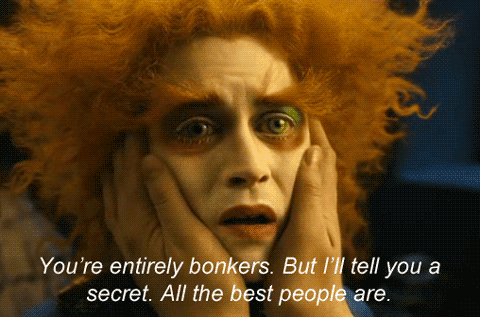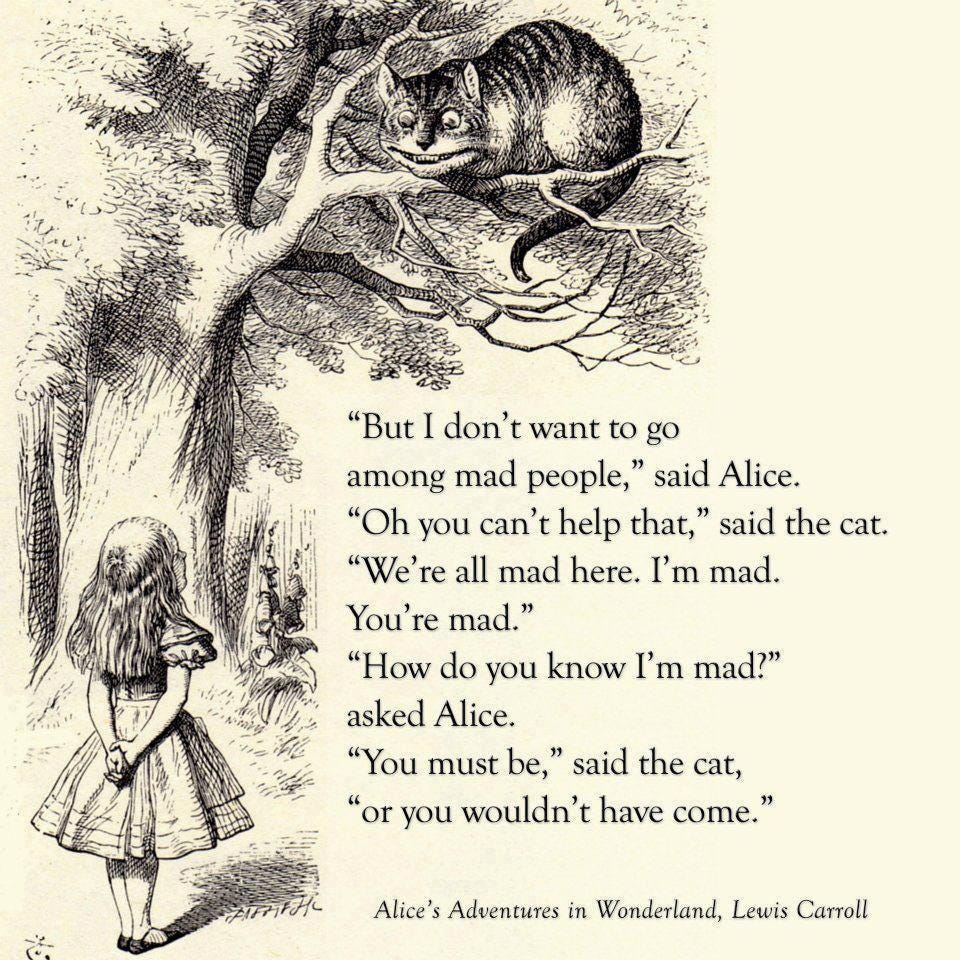
Wiki / Verrueckt
(umgeleitet von Wiki.Verrückt)
Inhaltsverzeichnis: (verbergen)
 "Kommt zu den gelben Sanddünen", 1842 |
|
Because the world is mad, the only way |
Im Altgriechischen hat das Wort ekstasis zwei Bedeutungen:
a) das Aussichheraustreten
b) Verrücktheit.
Wahn bedeutet eine falsche, irrige Meinung zu haben, sich etwas einzubilden, getäuscht, verführt oder betört zu werden. Wahnvorstellungen können fallweise bei einem Einzelmenschen oder einer Gruppe von Menschen auftreten.
|
Früchte der narzisstischen Normopathie: 💥 Pandemiewahn 💥 Klimawahn 💥 Kriegswahn
Die Mächtigen brauchen den Wahn zum Machterhalt.
| ||||||||||||||||||||||||||||||||||
Werte der narzisstischen Gesellschaft – Minute 36:08
| ||||||||
|
| ||||||||||||
| ||||||||||||||
| ||||||||||||||
| ||||||||||||||
| ||||||||||||||
| ||||||||||||||
Lösungswege – Minute 1:03:10
| Siehe auch: ► Zitate über Normopathie durch Selbstentfremdung – Hans-Joachim Maaz ► Zitate über Normopathie durch Selbstentfremdung – Arno Gruen und Hans-Joachim Maaz |
Viel Wahnsinniges
ist göttlichster Sinn
Für ein weit blickendes Auge.
Gar mancher Sinn ist ärgste Tollheit.
Hier sowie auch allgemein
Bestimmt die Mehrheit, was gilt.
Stimmst du zu – so bist du vernünftig.
Widersetzt du dich – so bist du gleich gefährlich,
Und wirst in Ketten gelegt.
| Quelle: ► Emily Dickinson (1830-1886) US-amerikanische Dichterin Complete Poems, Part One: Life XI, 1924 |
| Siehe auch: ► Transformation |
Persönliche Bekenntnisse
Als Thema ihrer Doktorarbeit im Fach Theologie wählte Myss die Untersuchung des Zusammenhang von Mystik und Schizophrenie.

Empfehlung
Appell
Warnung
Schlussfolgerungen
Zukunftsschau
Ermahnung – Einsicht
|
Literaturzitate
Filmzitate
Gedichte
Humor
Personal avowals
Calling

Recommendations
Appeal
Question
Conclusions
Future prospects

Insights
|
Sense ⇔ nonsense; right and wrong
|
Alternative translation: "There was never a genius without a tincture of madness."
The co-creative space where humans may partake in changing the world
Thinking ⇔ intuition; Existentialism ⇔ conspiracy perspective; ideology ⇔ creative divergent thinking, inside the box ⇔ outside the box
Scapegoating plot against the common good
The Apple Computer advertisement "Here's to the Crazy Ones" was adapted from the writings of Jack Kerouac.
The unconscious overwhelms the ego-consciousness, the field of awareness.
"Those who can make you believe absurdities, can make you commit atrocities."
|
Humor
Literary quotes
Quoted as a "heathen proverb" in: Daniel, a Model for Young Men, 1854 Rev. William Anderson Scott (1813-1885)
"Science has not yet taught us if madness is or is not the sublimity of the intelligence."
Caution
Movie, documentary and TV series quotes
When you are born in this world you're getting a ticket to a freak show,
and when you are born in America you're given a front row seat.
And some of us get to sit there with notebooks.
I am a notebook guy.
| Source: ► Video testimonial by George Carlin (1937-2008) US American stand-up comedian, social critic, idealistic cynic, actor, author, I Gave Up On My Species, YouTube film, 4:07 minutes duration, posted 15. May 2011 |
'Fire in the belly'
Alternative source: Dissolving the Ego, Realizing the Self. Contemplations from the Teachings of David R. Hawkins, M.D., Ph.D., edited by Scott Jeffrey, S. 120, 1st quote, Hay House, August 2011
Personal avowal
The Holy Grail of seamless transference of data is the SMART grid. It has more capacity as it has no binary 1s and 0s any more.
| Source: ► Deleted video interview with Christoph Karl La Due, US American savant, self-educated inventor, owner of 60 patents, founder of the unhackable Holophasec 3D technologies, Holophasec Energy, presented by the US American Conscious Media Network via Gaia TV, host Regina Meredith, 58:37 minutes duration, posted November 2009 Holophasec Energy translates circular feminine spatial harmonic language into logical straight linear dualistic language. Right brain communicating with the left brain. |
| Reference: ► Article What happened to Chris LaDue? Bipolar man dies in police custody, originally presented by the US American daily newspaper Mail Tribune, Ryan Pfeil, reissued by the Oregon Archive, 7. September 2012 |
| See also: ► Physics |
"Mad has become mainstream. Either that or society has sunk to our level." John Ficarra, coeditor of Mad magazine
Much madness
is divinest sense
To a discerning eye;
Much sense the starkest madness.
’T is the majority
In this, as all, prevails.
Assent, and you are sane;
Demur, – you’re straightway dangerous,
And handled with a chain.
| Source: ► Emily Dickinson (1830-1886) US American poet Complete Poems, Part One: Life XI, 1924 |
| See also: ► Transformation and ► Poems |
* * *
Alice: Am I crazy?
Dad: Yes, Alice, I think you are.
* * *
Alice: There is no use trying, said Alice; one can't believe impossible things.
Queen: I dare say you haven't had much practice, said the queen.
When I was your age, I always did it for half an hour a day why sometimes
I've believed as many as six impossible things before breakfast.

| Source: ► Lewis Carroll (1832-1898) English mathematician, logician, Anglican deacon, photographer, writer, Alice's Adventures in Wonderland, Macmillan, 26. November 1865 |
| See also: ► Poems |
Links zum Thema (Spirituelle) Verrücktheit / Spiritual madnessLiteratur
Literature (engl.)
Layers of reality exist side by side, frequently fusing into each other, and the acute self-awareness Mr. Sass calls hyperreflexivity, as well as a profound sense of alienation from the empirical world, run rampant. Sass denoted "striking similarities" between schizophrenia the workd of modernist art and literature as offered by Franz Kafka, Paul Valery, Samuel Beckett, Alain Robbe-Grillet, Giorgio de Chirico and Salvador Dali.
Madness is a is part of the psyche's self-healing dynamics when faced with seemingly irresolvable existential dilemmas. People who recover from these psychotic disorders do not merely return to their pre-psychotic condition, but often undergo a profound positive transformation with far more lasting benefits than harms. Externe Weblinks
External web links (engl.)
Modern Mad Scientists
Sent for reprint to Huffington Post, Rolling Stone, The New Yorker, Harper's Magazine, The Atlantic, this article got rejected by all.
Audio- und Videolinks
Nachlese des Psychiatrie-Justiz-Skandals um Gustl Mollath in Bayern – Hanna Ziegert bestätigt, dass Staatsanwaltschaft und Richter Gutachter
Eine verzerrte Realitätswahrnehmung verhindert rationales Denken und Handeln mit gefährlichen Folgen für politische Entscheidungen. Um eine friedfertige und sozial gerechte Zukunft unserer Gesellschaft zu sichern, müssen die verdeckten psychischen Motive der Selbsentfremdung als Ursache der Irrationalität aufgedeckt und aufgelöst werden.
Audio and video links (engl.)
Linkless media offering
Movie links (engl.)
|
Englisch Wiki
Hawkins
1 See also: Article Psychiatrists believed the ovaries caused insanity, presented by the website bible.ca, undated ⇑
2 Enter by the narrow gate. For the gate is wide and the way is easy that leads to destruction, and those who enter by it are many. For the gate is narrow and the way is hard that leads to life, and those who find it are few. Matthew 7, 13-14 (NT) ⇑